Marine Biology Adventure Camp
Overview
During this unique program, rising 9th graders – recent high school graduates will learn about sea turtles while building their knowledge of marine biology fundamentals and ocean conservation.
We have five species of sea turtles that migrate in the Atlantic Ocean off the coast of North Carolina— loggerhead, green, Kemp’s ridley, leatherback, and occasionally the hawksbill. Over the course of your stay, you will spend time caring for sea turtles while working alongside the volunteers and interns of the Karen Beasley Sea Turtle Rescue and Rehabilitation Center. From preparing food to cleaning tanks, you will understand the enormous amount of time, effort and love poured into every turtle. You will get to share this newfound knowledge during a public outreach event. The goal is to one day return them to the sea after being nurtured back to health. While walking the beaches looking for nesting mothers, we’ll learn about nocturnal adaptations. We’ll also patrol in the mornings looking for fresh tracks.
You will earn community service hours through your work at The Karen Beasley Sea Turtle Rescue and Rehabilitation Center, public outreach, and beach sweeps. Trash, especially plastic, kills thousands of marine animals each year, forcing many of them toward extinction. Sea turtles are no exception and ingest or get caught in everything from fishing lines to balloons. Sea turtles easily mistake plastic bags for sea jellies, their favorite food, which leads to malnutrition and potential death.
Each day we will explore different coastal habitats from maritime forests to salt marshes to the ocean’s edge. By understanding these ecosystems, we will better appreciate the plight of the sea turtle. Since the Sea Turtle Stranding and Salvage Network began keeping records in 1986 the number of stranded turtles has more than doubled, indicating that these creatures are in desperate need of our support.
This camp is designed for rising 9th graders – recent high school graduates, who are passionate about sea turtles and the marine environment. Join us on our next adventure as we:
- Work closely with the interns at the Karen Beasley Sea Turtle Rescue and Rehabilitation Center
- Go on turtle patrols early in the morning and late at night
- Tide-pool in North Carolina’s only natural rocky outcrop
- Species identification in the salt marsh
- Participate in a dissection
- Enjoy a behind-the-scenes tour at the North Carolina Aquarium
- Earn fifteen hours of community service credit
**Please note that all activities are subject to change without notice**
Due to our commitment to personal instruction, our low student-to-staff ratios ensure personal attention and maximize your camper’s educational adventure. Each camp session is limited to 24 students which are broken down into two pods of 12 guaranteeing everyone has a high-quality hands-on experience.
Camp tuition includes lodging on Topsail Island, all meals from dinner on the first day to breakfast on the last day, 24-hour access to camp staff, admission to all activities, all equipment, and transportation including pick up and drop off from the Wilmington International Airport (ILM), Sea Turtle Hospital donation, community service certificate, Sea Turtle Camp t-shirt, and memorable group photo. Campers are responsible for round-trip airfare to ILM or transportation to Topsail Island and additional money for souvenirs.
2025 Dates
Activities
Coastal North Carolina is surrounded by rich marine ecosystems that countless aquatic species call home. From the expansive Atlantic Ocean, with its miles of white sand beaches on barrier islands to the fluctuating and dynamic salt marsh habitats, Sea Turtle Camp gives you the opportunity to explore and study these amazing ecosystems in depth. We strive to provide teenagers with the opportunity to learn more about marine biology and conservation through hands-on, feet-wet experiential education. Campers get the extraordinary opportunity to work with live sea turtles as well as participate in some amazing daily activities designed to teach them through experience instead of out of a textbook.
During this awesome adventure you will:
- Volunteer at the Karen Beasley Sea Turtle Rescue and Rehabilitation Center
- Participate in a nighttime sea turtle nest/hatchling watch
- Explore the salt marsh and learn its vital role in the food chain/conduct species identifications
- Get a behind-the-scenes tour of the NC Aquarium at Fort Fisher
- Boogie boarding!
- Participate in a dissection
- Study dune/beach Ecology
- Kayak in the salt marsh
Daily Itinerary
Day 1-3
Campers arrive! Counselors will pick up campers flying in at the ILM airport between 12-3 pm and parents driving will check in between 12:30-2 pm. At orientation, all camper rules and the schedule for the week will be explained by your counselors. Then it’s off to dinner and evening activities where we will spend time getting to know each other. Afterward, we’ll head back to the bunks because those sea turtles are going to be hungry in the morning. The next day, we’ll head straight to work at the Sea Turtle Hospital, where you have the opportunity to volunteer at their 10,000-square-foot facility, with rooms dedicated to husbandry, surgery, and public education. After lunch, we will have a microscope lesson and discover what you cannot see with your naked eye. Dinner will be at the salt and light center and is followed by a walk on the beach and a hands-on nocturnal adaptation lesson!
Early on the third day, we’ll go on a nest patrol to check for sea turtle nests or tracks! Following the tides, we’ll travel to Kure Beach to explore the only naturally occurring inter-tidal ecosystem in North Carolina – the coquina outcrop. It’s a fun area to explore on our way to the Fort Fisher Aquarium. At the aquarium, we’ll follow the flow of water from the freshwater ecosystems of southeastern North Carolina all the way out to our limestone reefs. We not only get to explore each of these exhibits but get to go behind the scenes of the aquarium and feed the fish. After a full day of marine adventure, it’s time to relax and reflect on the day before another early morning at the hospital.
Day 4-6
Start the day with a kayak exploration, learning about the salt marsh! Experience the magic of Sea Turtle Camp by participating in community service with our beloved sea turtles. During your time at the hospital, you will learn about feeding habits, nutrition, cleaning, water filtration, and much more – while discovering the unique personality of each sea turtle. We also give back by inspiring others to keep our oceans free of life-threatening trash and plastics through daily beach sweeps. Prepare for a long night, because after dinner we search for nesting mothers while enjoying the bioluminescence along the shoreline.
On the final full day, we participate in a morning nest patrol, with the potential to witness one of the coolest sights for a sea turtle lover – fresh tracks in otherwise unmarked sand. After duties at the hospital, we will head to the salt marsh to go seine netting. Here we will learn about the importance of these brackish waters and identify some creatures that call it home. The Thursday night luau is what everyone has been waiting for! Enjoy some ukulele playing, grab a lei, and a burger. We’ll hang out by the campfire discussing how much fun we had this week and what we learned along the way. After everyone retires their leis, it’s time to pack up and clean up.
On the morning of the sixth, we’ll have a laid-back breakfast, then it’s back to the bunks for the final packing and cleaning duties. After exchanging contact information, you say goodbye to all of your new friends until next year’s Sea Turtle Camp. Check-out is between 12:30-1:30 pm and campers flying out depart between 1-2 pm.
** Schedule is subject to change! Please keep in mind that we try our best to adhere to this schedule but we cannot control mother nature! In the event of adverse weather, we have rainy-day activities in place. We cannot control canceled vendors. We will try our best to incorporate what was missed in later days, but it does not always fit into our schedule **
Accommodations
While at camp, students will be staying in the heart of the sea turtle action on Topsail Island. Pronounced Tops’l by the locals, this 26-mile long, quarter-mile wide barrier island has a rich history filled with pirates, fishermen, and surfers. Since Topsail Island is one of the less developed barrier islands in the area, groves of maritime forest still dot the island, and are rumored to hide Blackbeard’s treasure. Nowadays, Topsail is known as a laid-back beach town and a sanctuary for sea turtles.
Campers will be housed in fully furnished retreat center with an ocean view and beach access just a few feet away! This is an ideal location, as we will only be steps from our outdoor classroom. Students will see the sun rise over the ocean during morning nest patrols.

Students will enjoy dining together in our very own dining hall.
The rooms are gender-specific and feature air-conditioning, comfortable common areas, and gender specific bathrooms. Each participant will have his or her own bed. Sea Turtle Camp staff members are housed on-site and are available 24 hours a day for campers.
Campers will not only enjoy the breathtaking sunsets from the decks of the Retreat Center, but also private beach access, campfires, and outdoor activities such as volleyball, corn hole, spikeball, basketball, and much more.
As we are only minutes from the Karen Beasley Sea Turtle Rescue and Rehabilitation Center and beach, we can have a more active role in providing care to the turtles at the hospital and assisting the Topsail Beach Nesting Patrol. More hands-on opportunities and nest watching means more fun for the campers!
Frequently Asked Questions
Do I get to see real live sea turtles?
YES!!! We work very closely with the Karen Beasley Sea Turtle Rescue and Rehabilitation Center which has an average occupancy of about 20 sea turtles with varying degrees of injury or illness. Some are even permanent residents due to the severity of their injuries. The NC Aquarium usually houses a few and from time to time we even see them out in the ocean.
What kind of community service will I be doing?
At Sea Turtle Camp service is the most rewarding part of our program, and we like to think of it as service learning. Everything we do at the Karen Beasley Sea Turtle Rescue and Rehabilitation Center, from working directly with live sea turtles to cleaning and feeding sounds more like enjoyment than service, but it is. We also participate in a beach sweep.
Should I bring a friend?
While most participants come alone, you are welcome to come with a friend. Please indicate in the enrollment that you would like to room together.
I am a finicky eater. Can you cater to special diets?
Yes, we can accommodate many dietary restrictions and preferences. If your camper requires a special diet, we are happy to ensure your camper’s dietary needs are met. You will be asked about food allergies and special diets in your camper forms. If you have additional questions or concerns, our Program Coordinators would love to help you!
Can I call home during camp?
We have all campers check in with their parents upon arrival, but we have limited parental contact for the duration of the camp. Sea Turtle Camp is a growing experience, and we find that young people do best and gain confidence through independence. Campers are NOT allowed to carry cell phones at any time during camp. Any cell phones brought to camp will be collected upon arrival and returned upon departure. Parents will be updated through emails and the many pictures we’ll be posting on Facebook throughout the trip! We will provide an after-hours number to reach the office in the event of an emergency.
Is my camper allowed to bring electronic devices?
At Sea Turtle Camp, we promote immersive, hands-on learning experiences that are free from electronic distractions. While campers are allowed to bring cell phones and electronic devices for their arrival and departure days, once they have checked in with their parents/guardians and settled into camp, all electronic devices must be surrendered to our camp staff. These devices will be securely stored throughout the duration of the trip. It’s important to note that if any electronic device is discovered in a camper’s possession after the initial handover, it will be confiscated, and appropriate measures will be taken. However, we do permit campers to bring MP3 players and e-books. Please be aware that any device capable of connecting to Wi-Fi is not allowed.
What airport is best to fly into for your program, and do you provide a shuttle service?
The airport to fly into is the Wilmington International Airport (ILM), which is located 45 minutes from our facility on Topsail. Our educators meet all participants at baggage claim OR their gate. The shuttle cost to and from this airport is included in the program tuition. Participants must arrive and depart between 12-3 pm to ILM. If you have to arrive outside of our arrival and departure times, there are additional fees for a separate shuttle pickup.
What if I can't get in by the set check-in time?
Please contact our Program Coordinator to discuss arrivals and departures outside of our preferred times. In order to avoid missing any planned activities, participants driving in should try to arrive between 12:30 – 2 pm on the first day and depart around 12:30- 1:30pm on the last day of camp.
What is your cancellation policy?
Sea Turtle Camp is an extremely high quality, tight margined program with limited space. Therefore, once your student has been accepted into the program, exceptions to this policy cannot be made for any reason, including weather or personal emergencies. We strongly recommend families purchase trip insurance to protect their investment. Additional information for trip insurance coverage and providers can be found here. Please review the terms of our cancellation policy. In order to enroll in Carolina Ocean Odyssey, you must agree to these terms. Our full cancellation policy can be found
Does my child need to know how to swim to be able to attend this program?
Since water activities are physically demanding, we do require that campers be able to swim 25 meters unassisted and be comfortable in water where they can’t touch the ground. Our lifeguard-certified staff will conduct a swim test on the first day of camp to ensure the safety of each camper whenever they are in the water.


















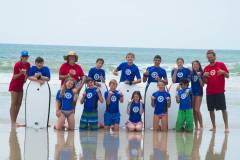
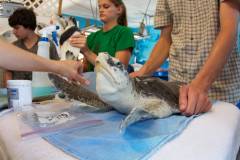
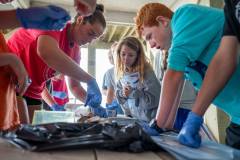
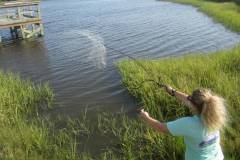
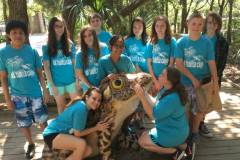
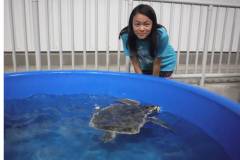
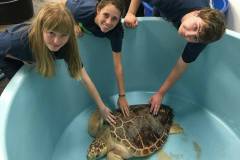
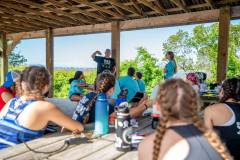
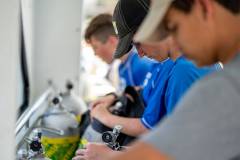

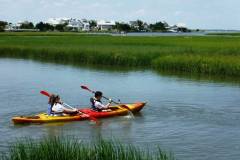
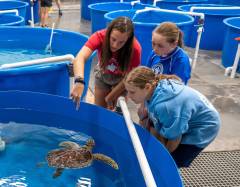
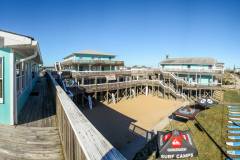


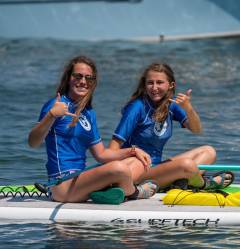



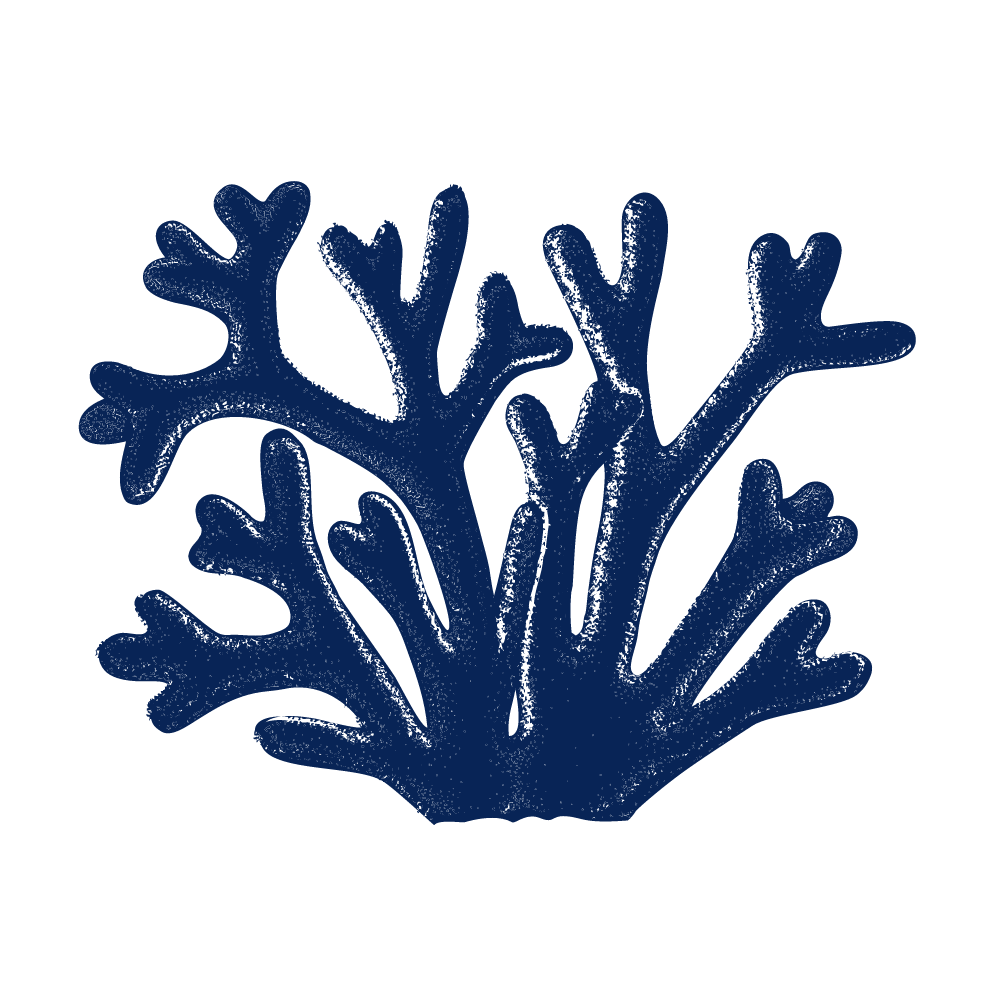 Marine Bio
Marine Bio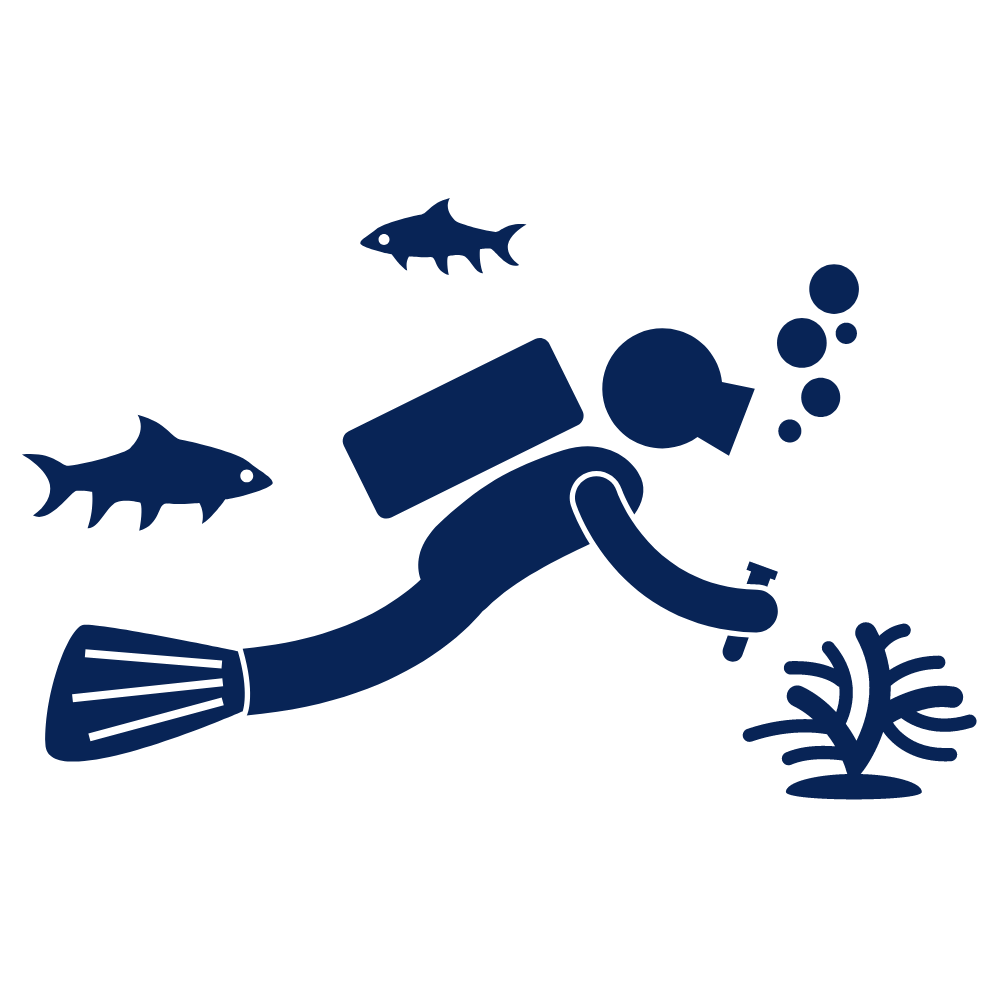 SCUBA
SCUBA Travel
Travel School Groups
School Groups Sign Up
Sign Up CONTACT
CONTACT CAMPS
CAMPS ABOUT
ABOUT